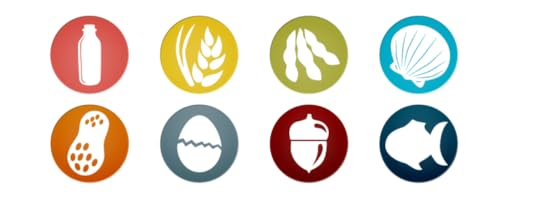Why You Need to Understand Food Allergies
Part 2 to Part 1: Fully Disabled: Fully Human
Dr. Ellen moved toward me for a hug of greeting.
“You’re wearing that perfume that gives me a headache,” she said.
“I’m sorry,” I mumbled, but I didn’t get how an expensive fragrance could bother her enough to embarrass me about it.
Over fifteen years later, I would learn about fragrance sensitivity, but at that time I wasn’t ready to listen.
Last fall, I finished a five-year ordeal of determining my husband’s stomach issues. After nights of suffering, watching him endure in the fetal position in hotels across the United States, finding the foods that triggered relief for me (mint, ginger, chicken soup, tomato soup, saltines, pasta with a butter or tomato sauce) did nothing for him or made him worse, we finally found a solution.
First, he needed his gallbladder removed.
Second, after taking an in-depth blood test (MRT), he discovered an acute food sensitivity to chicken, tomato, ginger, mint, oregano, gluten, chocolate, and quite a few more.
Not until I watched the man I love slowly lose his appetite for food, his freedom to eat out, his joy in travel did I develop the appropriate sensitivity to food.
And along the way I met Kim Middleton, RubySlippers commentor, wife and home schooling mother to two elementary aged children.
I used to think food allergies were rare or maybe exaggerated, but Kim taught me differently. One in thirteen children have a food allergy (Check out this infographic to get informed).
In my interview with Kim, who works as a Team Anaphylaxis Parent Advocate and leader of the Inland Empire Food Allergy Support Coalition, she explained why so many parents feel isolated when their children suffer from a food allergy.
In 2002, my daughter was literally born allergic to cow’s milk protein. If she ingests even a microscopic trace she will stop breathing within minutes. She is also contact allergic meaning she will develop hives if it touches her skin and then we must watch closely for an anaphylactic (life threatening) reaction. She also reacts to inhaling airborne milk protein such as walking through a restaurant or Starbucks where milk is being heated and is aerosolized. There are many places we simply must avoid. She must carry Epi Pens (Injectible Epinephrine) wherever she goes, even if just out for a walk.
Anaphylaxis is a condition that effects the whole family. Our home has been dairy free for many years out of necessity. Our entire family including her five-year-old brother must be vigilant 24/7 not to expose her. Adult caregivers must be trained on how to administer epinephrine. All outings and vacations must be planned in advance and within close proximity to a hospital. We pack food with us every single place we go.

In this world, attitudes about food have the power to unify or divide. Studies have shown that food allergic children have lower quality of life that those living with diabetes. It is a constant balance between normalcy and safety. We have lost many friends and family members who choose food and convenience over my daughter’s safety and spending time with us. Many people simply do not believe food allergies are real or serious.
What has your daughter taught you about food, people, culture?
People project all sorts of emotions, meanings and even experiences onto food and the necessity for it to be available at all times. We are a generation of parents raised on Capri Sun and prepackaged on-the-go snacks who no longer observe social graces such as sitting down to eat, or washing hands afterwards. It is easy to see how how our country has become obese when food is either expected or offered at every occasion. Food allergies put a magnifying glass on who people really are and how important you are to others.
Tell us a little bit about your work in advocacy for parents of children with food allergies
In 1990, life threatening food allergies were considered a disability by the ADA because it effects the major life functions of eating and breathing. As such, children with food allergies must be evaluated by public schools for 504 plans which offer accommodations to level the playing field so that food allergic students can access all aspects of the school day the same as their non-disabled peers. My daughter’s school violated her 504 plan and behaved so shockingly that we were forced to homeschool for her safety. We filed a complaint with the Office For Civil Rights and won our case. I have learned so much over the last several years of doing legal research. Our support group which consists of other food allergy parent advocates. We are openly Christian mothers working for free as a ministry. Our hope is that by teaching and coaching other parents to be effective advocates we will build a nationwide army that is equipped to defend itself against the public school system. In addition to giving parents information we pray for them and their life situations.
I have a simple daily prayer. “Please help me to help someone today.” As an advocate I have the humbling honor of discipling parents of children with special needs. I have two main goals, to encourage and to empower. However, it is the determination and tenacity of these parents that propel our movement for more education and enforcement of civil rights forward. I am rewarded by children gaining confidence because they are safe and living less fearfully, children who experience daily inclusion rather than exclusion at school, children who are able to attend their first school dance, able to participate in Girl Scouts, who don’t take risks to fit in, and who are confident in their ability to self advocate because they believe they are of equal value. These brave and compassionate children will someday lead us.
What can we do to help those with food allergies enjoy community with us more easily.
 Families with food allergies want to be included. Food focused events often exclude our participation because the environment is unsafe for us or our children. We greatly appreciate those who make us feel safe and welcome by supporting our needs. It’s not a joke (see here for an example of what we battle).
Families with food allergies want to be included. Food focused events often exclude our participation because the environment is unsafe for us or our children. We greatly appreciate those who make us feel safe and welcome by supporting our needs. It’s not a joke (see here for an example of what we battle).
If a family makes a request of you, it is because it truly takes a village to raise a food allergic child. One of the best ways to help allergic families is to eat in designated eating areas and to wash your hands afterward. That smudge of peanut butter or powdered cheese left behind on play equipment is capable of triggering a fatal reaction if accidentally ingested by a food allergic child.
If food allergies have a tendency to magnify flaws, they also create an opportunity for God to use others to stand in the gap to I am always amazed when people I barely know generously donate money for an allergy walk, demonstrate public support, seek ways to include us, and genuinely show care and concern.
What are some resources you can recommend:
Caring for Your Child with Severe Food Allergies by Lisa Cipriano Collins deals with the emotional aspects of this chronic condition.
FARE (Food Allergy Research and Education) foodallergy.org can direct those seeking support to local groups.
There are also many wonderful groups on Facebook with varying levels of privacy.
For families with school aged children attending a federally funded institution, I highly suggest obtaining a 504 accommodation plan for your child. Life threatening food allergy is considered a disability under the ADAAA and Section 504 of the Rehabilitation Act offers legal protections against discrimination and guarantees equal access to the educational environment.
Food allergy support group. You will need help with so many things: what manufactured foods are safe for certain allergies, how to read a food label, how to substitute food ingredients, what medications, allegens, soaps, lotions, sunscreens, cosmetics are allergen free, how to’s (eat at a restaurant, vacation, deal with a disbelieving spouse who keeps feeding allergens to a child, mother-in-laws who think you are putting your child in a bubble, send a child to school safely etc)…the list of questions is endless. Food allergy parents are constantly fatigued from the stress of food shopping, preparing safe foods, advocating on behalf of their child everywhere they go, supervising play dates, being room mom, attending all field trips, Dr. appointments, managing jobs, homes, and nurturing children who are often excluded or suffer anxiety, all the while being criticized as a neurotic parent. Support groups offer empathy and community.
To support Kim, join or share her support group, share this post or friend Kim on facebook. Kim will be joining us in the comments, so feel free to pepper her with questions.
Jonalyn Fincher's Blog
- Jonalyn Fincher's profile
- 9 followers



